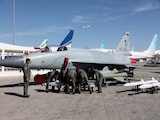Stressing higher spending on research and development (R&D), Defence Secretary Rajesh Kumar Singh said on Friday that Operation Sindoor served as a reality check for the armed forces by pointing out the areas where we can do better, where we need to adapt to the changing needs of nuclear warfare.
Speaking to media persons on the sidelines of the Defence Tech 2025 Seminar - STRIDE (Synergy of Technology, Research, Industry & Defence Ecosystem) at the RSAMI, Pune, Mr Singh said that currently, just 0.66 per cent of the GDP is spent on R&D, and two-thirds of this is done through the public sector, like the Defence Research and Development Organisation.
"We cannot move ahead in the defence sector without R&D. We need to change the current situation as the private sector has negligible contribution in this field," he said, adding that the government has decided to share 25 per cent of the Technology Development Fund (TDF) of the DRDO with the private sector and also created a Rs 1 lakh crore research fund under department of science and technology.
"In the past three years, nearly Rs 1,500 crore has been shared with start-ups and private sector firms under TDF," he said.
Talking about indigenous efforts for defence equipment, he said, "At a broader level, as I mentioned, we have already decided that we will spend not less than 75 per cent of our defence spending domestically. Last year, we actually spent 81 per cent entirely within the country."
He did not favour raising the country's defence budget, saying, "Such a need may arise only when we manage to use the current budget optimally. There are no financial constraints, the finance department is willing to increase our capex by 10-15 per cent every year, and this will be sufficient to meet the requirements of the armed forces."
Shedding light on fighter jet engines, he said the country is close to developing a collaboration with an international engine house, along with the DRDO.
"That's a long-drawn process that will take as much as a decade to develop," said Mr Singh at the Defence Tech 2025 Seminar - STRIDE (Synergy of Technology, Research, Industry & Defence Ecosystem) today at the RSAMI, Pune.
He said efforts were also being made to reduce our dependence on foreign suppliers for marine engines as well.
The Southern Command of the Indian Army is organising the Defence Tech 2025 Seminar - STRIDE (Synergy of Technology, Research, Industry & Defence Ecosystem) today at the RSAMI, Pune.
The seminar, themed "Atmanirbharta through Partnership - Industry, Academia, Armed Forces," brought together the nation's leading stakeholders from academia, industry, research organisations, and the Armed Forces to foster collaboration, accelerate indigenous capability development, and promote adoption of disruptive technologies in defence.
The event was attended by Lt. Gen Dhiraj Seth, PVSM, AVSM, GOC-in-C, Southern Command, alongside senior Army leadership and distinguished representatives from the defence ecosystem.
The session, themed "Fast Tracking Development of Niche Tech for Indigenous Systems" saw discussions covering reverse engineering, industry-funded academic research, and DRDO's role.
Deliberations on the growth of the Indian Defence Manufacturing Ecosystem saw the participants focus on contributions of private industry, PSUs, and academia.
The seminar marked a step towards building a robust, self-reliant defence industrial base while nurturing partnerships to meet the future challenges of national security.
(Except for the headline, this story has not been edited by NDTV staff and is published from a syndicated feed.)















